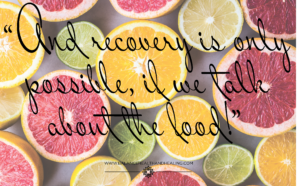I find that clients with eating disorders are expert at NOT talking about food or their eating disorder behaviors. They are SO expert at this, many have even developed the skill of SEEMING like they are talking about it…but they are so vague and slippery in the details, I can’t gather any real clinical information. As treatment progresses and clients enter the realm of recovery, talking about behaviors is easier and more natural, especially as clients share new insights and victories along their journey. But in the beginning of treatment, it often feels like pulling teeth to get clients to be specific about their behaviors.
There are myriad reasons why it can feel like playing cat and mouse in a session when trying to address food and behaviors. Eating disorders thrive on secrecy and shame. It can be incredibly difficult and painful to be honest about eating disorder behaviors. Further, sometimes clients feel little motivation to change their behaviors as they experience certain benefits from their eating disorder and are still striving for weight loss. So talking about food and behaviors in the room can feel threatening to that paradigm. Clients with eating disorders also often have significant other concerns in their life, whether that be with other emotional disorders like depression or anxiety, relationship distress, or other life struggles. These issues may feel more urgent and pressing than eating disorder behaviors and naturally they want to address these concerns above all else. Clients may also not see a connection between their eating patterns and distress. In the diet culture we are all surrounded by, their behaviors may feel “normal” and may even be reinforced by others around them. For these reasons and others, I can honor that clients don’t want to talk about food and behaviors.
and painful to be honest about eating disorder behaviors. Further, sometimes clients feel little motivation to change their behaviors as they experience certain benefits from their eating disorder and are still striving for weight loss. So talking about food and behaviors in the room can feel threatening to that paradigm. Clients with eating disorders also often have significant other concerns in their life, whether that be with other emotional disorders like depression or anxiety, relationship distress, or other life struggles. These issues may feel more urgent and pressing than eating disorder behaviors and naturally they want to address these concerns above all else. Clients may also not see a connection between their eating patterns and distress. In the diet culture we are all surrounded by, their behaviors may feel “normal” and may even be reinforced by others around them. For these reasons and others, I can honor that clients don’t want to talk about food and behaviors.
But we have to talk about food. We have to talk about their behaviors. And here’s why:
- Eating disorders have the highest mortality rate of any mental illness. They are no joke. I have to ensure that my clients are getting the appropriate level of treatment they need and I need to know all the nitty gritty details of their behaviors and eating disorder history in order to make this assessment. My top priority with clients is their health and wellbeing. This has to be addressed above all else.
- I cannot help clients with other concerns in the presence of significant eating disorder behaviors. If someone is malnourished or nutritionally deprived, their brain does not work optimally. We can talk about their emotional concerns until we are blue in the face, but physiologically, a brain needs to be nourished to BE ABLE to engage in emotion regulation, learn and use new coping strategies, and to change maladaptive belief patterns that exacerbate emotional distress. In other words, any talk therapy I do with clients, won’t be helpful unless my client’s brains are nourished so they are functioning optimally.
- Clients with eating disorders are often quite distressed about their relationship with their body and food. Even if eating disorder behaviors are infrequent or “minor,” such as purging once a week, or restricting just a little, we still have to talk about this and work toward behavioral change. Our belief systems take information from our behaviors. In other words, someone cannot free themselves of their fears around food when they continue to treat food as something to be feared or controlled through restriction, food rules, purging, and compensation. Further, we cannot make progress toward body acceptance when someone is proactively working to change their body. In eating disorders, behavioral change is the necessary antecedent to emotional and cognitive change.
- As treatment progresses and clients enter the realm of recovery, we have to keep talking about residual eating disorder behaviors. Many times, clients report wanting to “hang on” to parts of their eating disorder. They want to keep their eating disorder, “just a little.” I understand this, especially if clients have a longstanding history with their eating disorder and in many ways it served them well. But keeping “parts” of an eating disorder is unrealistic. I talk with clients that an eating disorder is a demanding companion. It will never be satisfied with “just a little restriction” or “just a few food rules” or “just a few more pounds to lose.” The eating disorder is a jealous lover and demands all your energy and time. It is vulnerable to ultimately relinquish all eating disorder behaviors, but it is necessary if true recovery is possible. So even months or years into treatment, when clients seem to be “behavior free,” I always check in with them if there are residual eating disorder behaviors or attitudes we need to continue to address.
 I love my job. Treating clients with eating disorders is incredibly rewarding and challenging. Even though I didn’t become a psychologist to talk about food, I enjoy exploring client’s relationships, history, and beliefs about food and witness so much bravery and vulnerability in this exploration. As eating disorder behaviors begin to change and lessen, it is incredible to witness client’s delve into the deep, messy, underbelly that was their eating disorder. Eating disorders are more than food. They are someone’s relationship with themselves, their past, and others. In other words, it is their relationship with life. And nothing is more transforming than the liberation experienced through recovery. And recovery is only possible, if we talk about the food!
I love my job. Treating clients with eating disorders is incredibly rewarding and challenging. Even though I didn’t become a psychologist to talk about food, I enjoy exploring client’s relationships, history, and beliefs about food and witness so much bravery and vulnerability in this exploration. As eating disorder behaviors begin to change and lessen, it is incredible to witness client’s delve into the deep, messy, underbelly that was their eating disorder. Eating disorders are more than food. They are someone’s relationship with themselves, their past, and others. In other words, it is their relationship with life. And nothing is more transforming than the liberation experienced through recovery. And recovery is only possible, if we talk about the food!

